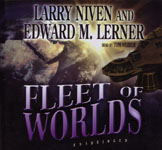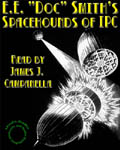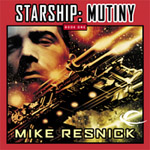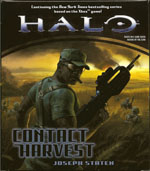
 Fleet Of Worlds
Fleet Of Worlds
By Larry Niven and Edward M. Lerner; Read by Tom Weiner
8 CDs – Approx 9.5 Hours [UNABRIDGED]
Publisher: Blackstone Audio
Published: 2008
ISBN: 1433229420
Themes: / Science Fiction / Hard SF / Aliens / Physics / Space Travel / Sociology /
Larry Niven teams up with fellow science-fiction writer Edward M. Lerner to take a closer look at the events leading up to Niven’s first Ringworld novel. Kirsten Quinn-Kovacs is among the best and brightest of her people. She gratefully serves the gentle race that rescued her ancestors from a dying starship and nurtures them still. But, if only the Citizens knew where Kirsten’s people came from! A chain reaction of supernovae at the galaxy’s core has unleashed a wave of lethal radiation that will sterilize the galaxy. The Citizens flee, taking with them their planets, the Fleet of Worlds. Someone must scout ahead, and Kirsten and her crew eagerly volunteer. But as they set out to explore for any possible dangers in the Fleet’s path, they uncover long-hidden truths that will shake the foundations of worlds.
Not knowing much about Edward M. Lerner or his style, it’s hard to know precisely what parts of this novel he wrote. On the whole it definitely feels like a Larry Niven book. And of course that’s a very good thing. Surprisingly nice, this “known space” novel doesn’t feel like it’s just embellishing the dark corners we’d little explored before. There is material to be mined, and mine it they do. We learn more about the General Products corporation, early Puppeteer influence on Terra, and the back story to Niven’s classic The Borderland Of Sol. The heart of the novel though is Nessus’ interaction with a crew of Humans. As well, Niven and Lerner, introduce an entirely new and compelling alien species, though we really don’t get to interact with them. Its hard to get into much more without giving out a lot of spoilers. Suffice it to say, this is a fine, though definitely lesser entry into the “known space” canon. When recommending a novel universe, I would always start with the strongest book in that universe, and expand out from there. If you haven’t read any Niven novels before this one, go listen to Protector and Ringworld first. Then, if you are as enchanted as I was with it, come back to Fleet Of Worlds for more.
Tom Weiner, who is one of Blackstone Audio’s new narrators, previously heard in A Galaxy Trilogy, brings authority to the narrative of Fleet Of Worlds. He has to work pretty hard to do both the puppeteer contralto that is supposed to sound like “Cleopatra, Helen of Troy, Marilyn Monroe, and Lorelei Huntz all rolled into one.” But both it and the human females Weiner performs come off well enough – giving more of an impression of a voice change than any actual transformation.
Update: Edward M. Lerner tells me that that the follow up to Fleet Of Worlds, titled Juggler Of Worlds, is also slated for a Blackstone Audio release!
Posted by Jesse Willis







